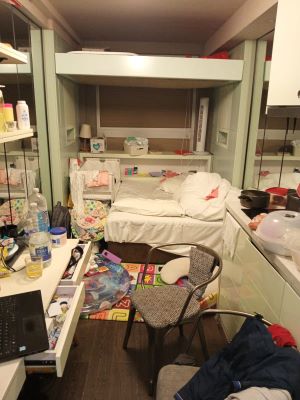Suffering and squalor: the impact on mental health of living in hotel asylum accommodation
For most people, the word ‘hotel’ has positive connotations, reminding them of holidays and time spent relaxing and recharging. But this is not the case for people seeking asylum in the UK, who are forbidden from working or accessing benefits while waiting for a decision on their asylum claim and are forced to live in hotels for months, or even years, in dirty overcrowded rooms while relying on exceptionally low levels of financial support and substandard food.
A new research study, undertaken with clients of the Helen Bamber Foundation (HBF), analysed clinical data from 110 participants and found higher levels of mental health difficulties for people seeking asylum living in hotels compared to those living in alternative housing. This echoes the experiences of people supported by HBF and Asylum Aid, captured in the report ‘Suffering and Squalor: the mental health impact of living in hotel asylum accommodation’. Those living in hotels reported feeling unsafe, lacking privacy, not being able to meet their basic needs, and feeling as if they were imprisoned.
In March 2024, over 30,000 people were living in hotels and large sites, 12,000 of whom were in London. The current average length of stay is over six months, during which people are stuck in cramped rooms, with limited freedom to come and go, not enough money for essentials (just £8.86 a week) and limited access to healthcare, legal advice, or means of communication.

This room is for a family of three - two adults and a nine-month old. Their baby is close to having lived the first year of her life here and this is the family's only room.
"[We are given] food that even animals will not eat."
One of our clients, Abbas, was diagnosed with a rare form of cancer, and undertaking radiotherapy while at a hotel. He was diagnosed with ‘disease related malnutrition’ and prescribed supplements. The oncology dietician noted that as he lives in a hotel he has “no access to suitable foods to maintain stable weight during treatment. Current dietary intake causing abdominal pain and gastrointestinal issues.” In a later oncology review, it was noted that he had contracted scabies yet again, and he remained living in a hotel. Despite legal proceedings and extensive medical evidence, Abbas was not moved to dispersal accommodation by the Home Office. He was also asked to share a room with strangers, despite his significant physical and mental health conditions.
"It was a depressive space because there were too many people and not enough space."
Residents in hotels have reported rooms with mould; rotten carpets; unclean bedding; rooms smelling of sewage; broken beds; worn-out mattresses; mice and bed bugs.
One client had rats running around his accommodation. As well as being unhygienic, this was particularly distressing for him because the prison where he was detained and tortured was overrun with rats and the sound of them triggers him and causes flashbacks.
The use of hotels is not only harmful, but also eye-wateringly expensive. Private companies are paid more than £8 million a day to provide ‘contingency’ accommodation in hotels. The Home Office spent around £3.6 billion on asylum support costs in 2022/23, nearly double the amount spent in 2021/22 - about £2.28 billion of that was spent on hotel accommodation. And this cost is entirely the result of hostile government policies and mismanagement of the asylum system due to which the backlog of people waiting for decisions on their asylum claims has grown to historic levels. To manage this backlog, four years ago, the Home Office started to use what was called ‘contingency’ accommodation – hotels and ex-military barracks – for asylum housing. Despite the then Prime Minister pledging to end the use of hotels in 2023, hundreds remain open.
Rather than addressing the underlying systemic problem of delays in decision making, the main attempt to reduce the use of hotels has been ‘Operation Maximise’, which has involved housing as many people as feasible in the same bedroom, with significant negative impact on those forced to room-share. Forced room-sharing can be very harmful to survivors of torture and trafficking, many of whom have significant mental health difficulties exacerbated by having no privacy and feeling unsafe.
People seeking asylum are an inherently vulnerable population because of their experiences of war, conflict, torture, human trafficking and abuse. They face significant healthcare challenges and have a high prevalence of trauma symptoms. Those who are housed by the Home Office need appropriate access to food, privacy, safety, to be based within communities rather than in isolated rural areas, and accommodation which is suitable for their particular needs.
We have witnessed how the awful living conditions, lack of privacy and nutritious food have impeded the recovery of those who have already endured extreme human cruelty. The conditions are so bad that one of our clients slept on an armchair in the corridor every night after having moved to a shared room as he felt safer there than in a room shared with a stranger. This young person had experiences of sexual victimisation in childhood.
The use of hotels at current levels is a very recent phenomenon and has been a political choice, instead of a necessity. Repairing the broken system of housing people seeking asylum requires addressing the broken asylum system as a whole.



